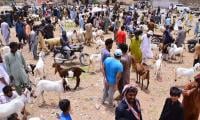Islamabad: WWF-Pakistan and the United Nations Office on Drugs and Crime (UNODC) inked an accord Thursday to curb illegal wildlife trade in Pakistan through innovative means such as institutional capacity building of frontline law enforcement officers and joint campaigns to raise awareness on the issue.
The collaboration will contribute towards enhancing capacities of law enforcement agencies such as Pakistan Customs, to acquaint its officials about key aspects of illegal wildlife trade as a prelude to enhanced vigilance against wildlife trafficking.
UNODC recognises wildlife crime as the third largest transnational crime after drugs and human trafficking. Illegal wildlife trade has a devastating impact on biodiversity and ecosystems.
Speaking on the occasion, UNODC Representative Cesar Guedes said, “It take a great stretch of imagination to see how illegal wildlife trade is not solely an environmental injustice, but also undermines state authority, fuels violent conflict and terrorism, and impacts national and global security and socioeconomic development. Estimated to generate US$20 billion annually, illegal wildlife trade is one of the largest global illegal activities.”
Guedes recollected that one of the key observations that the database enshrined on the World Wildlife Crime Report 2016 illustrates is the extreme diversity of this illegal activity: nearly 7,000 species are included in the seizures, yet no single one represents more than six per cent of the total, nor does a single country constitute the source of more than 15 per cent of the seized shipments. He said, educating frontline law enforcement officers will alert them on new risks and will enable them to identify and intercept wildlife that are being trafficked and “we are happy to be able to contribute in stopping this trend through this initiative.”
Senior Director Programmes at WWF-Pakistan Rab Nawaz hoped that the partnership with UNODC would set a benchmark to address wildlife trafficking in Pakistan and further strengthen efforts to support the capacity building of trade monitoring and regulating authorities. He added that WWF-Pakistan has recently initiated a snow leopard conservation initiative focusing on adoption of zero-poaching framework to protect the species from poaching and illegal trade. This would include piloting of Spatial Monitoring and Reporting Tool (SMART), a technology-based approach to support effective conservation of the species.
Representational file. — APP FileRawalpindi:A speedy bus overturned after hitting an electric pole resulting in...
Political Counsellor of Great Britain in Pakistan, Zoe Ware called on Federal Minister for Privatisation, Board of...
The delegation, accompanied by senior officials from the British Council and the Higher Education Commission of...
Inspector General of Police Islamabad, Syed Ali Nasir Rizvi. — Radio PakistanIslamabad: In light of the special...
National Commission for Human Rights logo. — Facebook/National Commission for Human RightsIslamabad: The National...







